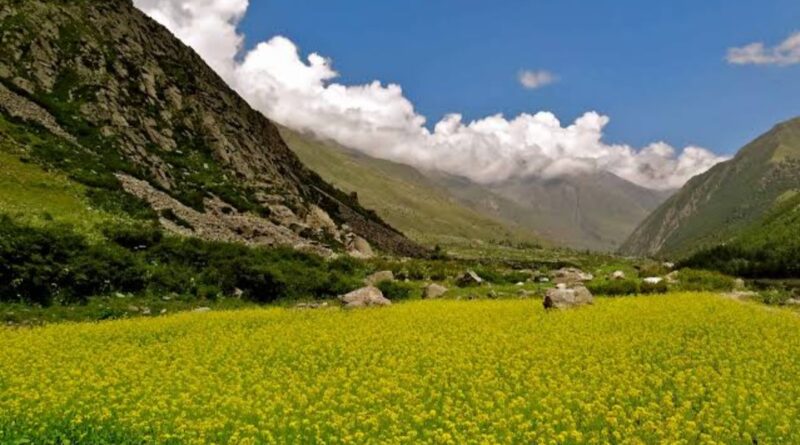Two-Day Himalayan Conference from November 15–16, to be organized at Saksharta Bhavan, Mandi
Focus: Himachal Pradesh — Environment, Climate Change, Disasters, Livelihoods, and Public Participation
The Himalayas, the lifeline of our country, are currently facing a severe crisis. Sensitive mountain states like Himachal Pradesh are directly bearing the impacts of climate change, unregulated development, and increasing disasters. This is a decisive moment — a time when we must choose whether to continue on a path of destruction or take steps toward rebalancing with nature.
Since the Industrial Revolution, the Earth’s average temperature has risen by approximately 1.2°C. Scientific studies indicate that the Himalayan region is warming nearly twice as fast as the global average, placing its ecology, glaciers, and water sources under severe threat. Despite international agreements, commitments to reduce carbon emissions remain unfulfilled. Developed nations, responsible for far greater carbon emissions compared to developing countries, are retreating from their responsibilities. Meanwhile, developing nations like India are demanding equitable climate solutions, technological cooperation, and accountability.
In recent years, disasters such as unusual rainfall, glacier melt, floods, and landslides have affected thousands of families in Himachal Pradesh. These disasters are not merely the result of “nature’s fury” but are also driven by our unbalanced development model — deforestation, unregulated construction in river valleys, neglect of water sources, and the expansion of roads and other projects without environmental impact assessments.
As a result of these disasters, thousands of families have been left landless and homeless. Those affected by the 2023 disaster are still awaiting rehabilitation, while new disasters and displacements occur every year. Due to central forest and environmental laws, the state government is unable to proceed with rehabilitation, as nearly 67% of Himachal’s land area falls under forest cover, and the state lacks sufficient non-forest land for resettlement.
Development cannot be symbolized merely by the expansion of roads, electricity, or tourism. True development is that which enhances the quality of life, ecological balance, and self-reliance of local communities. In regions like Kullu, Mandi, Shimla, Kinnaur, and Lahaul-Spiti, issues such as over-tourism, land degradation, and increasing pressure on resources have sounded alarm bells. It is now time to shift the focus of development toward ecological restoration, watershed management, and sustainable livelihoods.
Himachal’s economy is based on agriculture, horticulture, forestry, and tourism. With changing times, the people of the mountains face both new challenges and opportunities. It is now essential to strongly implement constitutional provisions, empowering Panchayats and local bodies to play a central role in planning, disaster management, and the conservation of natural resources.
To facilitate collective discussion and action on these pressing issues, a two-day Himalayan Conference is being organized on November 15–16, 2025, in Mandi. We urge all organizations, activists, researchers, and citizens to join this initiative and share their ideas, experiences, and collaboration.
Outline of the Two-Day Program
November 15, 2025 | Public Hearing
An effort to center the voices of disaster-affected communities — formulating effective rehabilitation strategies through their experiences, struggles, and lessons.
November 16, 2025 | Discussions and the Way Forward
- Impact of Mega Projects on Himalayan Ecology: Deliberations on independent ecological risk assessments and a special policy for the Himalayas (recommendation of the Himalaya Policy Campaign).
- Land Use Change and Laws: Discussion on land-related laws and state investment policies (Ease of Doing Business) — Forest Conservation Act, Forest Rights Act, Himachal Pradesh Tenancy and Land Reforms Act 1972 (Section 118), and other relevant laws.
- Sustainable Development Strategy for Rural Himalayas: A shared action plan toward citizen awareness, eco-friendly livelihoods, and accountable governance.
- Development Model Respecting Himalayan Water, Biodiversity, and Social Diversity: Deliberations on disaster preparedness and climate-resilient policies.
This conference aims to bring together the deepening environmental crisis of the Himalayan region — particularly Himachal Pradesh — the changing climate scenario, disaster experiences, and the voices of local communities on a shared platform. Its goal is to foster dialogue between policy, science, and people’s movements, so that a development model aligned with the soul of the Himalayas — balanced, inclusive, and future-secure — can emerge.
This initiative is grounded in the belief that the mission to save the Himalayas will only succeed when it reaches every village and Panchayat — when the people themselves become the guardians of their water, forests, and land.
Organizers:
Ekla Nari Shakti Sangathan | Bhumi Adhigrahan Prabhavit Manch | Himalaya Niti Abhiyan | Himlok Jagriti Manch | Himachal Gyan-Vigyan Samiti | Himdhara Environment Research and Action Collective | Jibhi Valley Tourism Development Association | Loktantra | Democratic Nation Building Abhiyan | Mandi Saksharta Samiti | People for Himalaya Campaign | Parvatiya Mahila Adhikar Manch | Jan Abhiyan for Socio-Economic Equality | Save Lahaul-Spiti
(Names of other organizations will be included after their consent. This event will only be possible and successful with the active participation of all organizations.)



